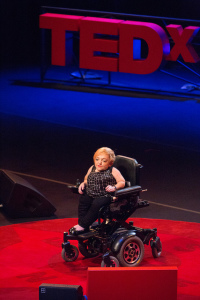A simple definition of impulsivity after brain injury: Talking or acting without thinking.
For a fun kind of explanation the cartoon above might help. A reminder of the impact of acting without thinking.
For more detail and suggested strategies read on.
What Is Impulsivity After Brain Injury?
As the cartoon above demonstrates impulsive actions are those made without taking into account possible problems, and not thinking about possible consequences.
While we can all be impulsive at times, impulsivity after brain injury is caused by damage to the brain, specifically the frontal lobe and it does not just go away. The mechanisms that control our ability to stop and consider, and to filter what we pay attention to, are damaged.
It is important to remember the impulsive behaviour you see, is related to the damage to the brain
[unordered_list style=”green-dot”]
- it is not deliberate
- it may not be apparent to the person themselves
- it is unlikely to go away
- it can fluctuate, particularly when a person is tired
[/unordered_list]
You will also see impulsivity called ‘poor impulse control’, I have an issue with this term so I don’t use. Why not? To me it sounds blaming, sounding like it is the person’s fault. However if you are searching for more resources you might need to search this term along with impulsive behaviour etc.
Impulsivity after Brain Injury. What does it look like?
As with most things about brain injury, impulsivity after brain injury will be different in each person. It is suggested that King Henry VIII with his suspected brain injury was impulsive he beheaded his wives, we don’t see that so much today!
Mostly it will involve doing or saying things without thinking first. Impulsivity after brain injury might include one or more of the following:
[unordered_list style=”green-dot”]
- Moving on to another task or activity before completing what is already started.
- Rushing into activities without planning first and making lots of mistakes.
- Interrupting conversations and talking over others.

- Blurting out personal information about self or others without thinking.
- Making hurtful comments.
- Having trouble waiting and taking turns. Not waiting for your turn. Not patiently waiting in line. A student jumping in with answers in a classroom.
- Not recognising you have just finished: eating, drinking, smoking, so you continue without stopping.
- It can seem like the need for ‘instant gratification’ – you want, and do, things now! It does not seem possible to wait.
- Buying things on impulse even when not affordable.
- Lashing out physically or verbally without thinking of the consequence.
- Sexually and socially impulsive may be promiscuous. This can be a danger to the person at times.
- Not being able to budget and manage finances.
- Ignoring safety rules. Not looking for traffic before crossing the street.
- Undertaking tasks without first thinking about safety. Using something inappropriate to do a task because it is the first object you see.[/unordered_list]
Please add any further outcomes you might be aware of in the Comments below.
Broken Brain – Brilliant Mind is a blog written by a person with traumatic brain injury. The article “The Problem with Impulsiveness” describes the personal experience of living with impulsivity.
“Okay, you say, so you’re a bit impulsive at times. Who isn’t? What’s the big deal?
Here’s the big deal: With me, there’s no such thing as “a bit impulsive”. I’m REALLY impulsive. “
“I’m sure there are plenty of people who struggle with this. But for me, TBI has a way of making everything bigger and badder than it would normally be “
“The other problem with impulsiveness, is that the things I tend to give into — though they may feel good at the time — don’t actually help me live my life in a productive way. Giving in to the impulse to yell at my spouse or other loved-ones has rarely produced positive results (to put it lightly). At the moment, when I’m venting at them, it feels honest and true and sincere, but it doesn’t do much for them. And I end up straining important relationships, thanks to not curbing my impulses.” Broken Brain – Brilliant Mind 27 Feb 2011.
What Can You Do To Support a Person with Impulsivity After Brain Injury?
Before putting strategies into place consider what you are trying to achieve:
- Ideally the aim is create new pathways to overcome difficulties, or learn ways to work around around the difficulties. Sometimes the strategies might need external support such as support, aids, monitoring.
- The best strategies are those that fit with the person’s strengths, their abilities and readiness.
A range of potential strategies are listed below.
You might find this video “Impulsive Behaviour” helpful. It is a promotional clip for a learning centre, and it has a series of examples and strategies for children who are impulsive. This video is not about children with brain injury yet the examples and strategies may be helpful for both children and and adults. Though the way these strategies are implemented would be very different for an adult. Key strategies discussed are:
“Identifying triggers can help adults anticipate and prevent impulsive behaviours
Intervene early by removing the child from the situation
Provide activities that encourage the child to exercise impulse control
Responding to impulsive behaviour should be immediate, short and swift
Provide positive feedback and attention when kids behave appropriately”
Tips and Suggestions
Agree on, and use a consistent approach that encourages thinking and waiting.

- Teaching “Stop + Think + Do”.
- Stop – before doing or saying something
- Think – about what impact this will have and what would be the best strategy
- Do – the action / behaviour selected
- If an impulsive behaviour occurs. Stop the impulsive action and explain why you stopped it.
- Give clear, consistent feedback each time about
- what was OK,
- what should have happened,
- and what needs to change.
- as part of the feedback talk about the impact of impulsive actions for the person and and on others.
- Agree on, and set safety limits – to protect the person you are with and yourself. Talk about those limits and how you will maintain them.
- Stay positive and calm. Easy to say, but harder to do, when someone does something sudden or unexpected.
- Reduce the opportunity to be impulsive with structure and planning.
- Work and agree on the plan for daily routine and activities together.
- Break activities and tasks into manageable steps.
- Further strategies for planning HERE
- Be aware of safety both at home and in the community and remain vigilant about potential areas that might cause difficulty:
- In the community busy roads, shopping centres with excessive noise and distraction, unsafe areas or roadworks. If a child is prone to impulsive actions you might walk on the road side of the child and stay close enough to be able to stop the child.
- Look at areas in the home that create distractions, obstacles such as loose rugs, furniture or uneven areas that might be unsafe with sudden movement particularly if balance and stability are issues.
- Be aware of items that might create a danger such as work tools, knives, weapons. Remove them or supervise accordingly.
- Tailor the level of support to the situation. The more potentially dangerous a situation is, the more support and supervision may be needed.
- Practice strategies when there is not a risky situations to help slow down or reduce impulsive reactions.
- Support family, friends, and colleagues to understand and work to manage impulsive behaviour.
Please share further strategies you have tried in the Comments below.


Pingback: Behaviour in Brief - Challenging Behaviour After Brain Injury - Changed Lives New Journeys
Pingback: Changed Decision Making After Brain Injury - Changed Lives New Journeys
This sounds a lot like ADHD are you sure the brain injury may just be making ADHD worse and sometimes even recognizable to some people?
Hi Brooklyn, Yes the outcomes of ADHD, Autism and Aspergers syndrome all have similarities with brain injury and vice versa. Who knows what we may one day discover about the link (or not) between them.